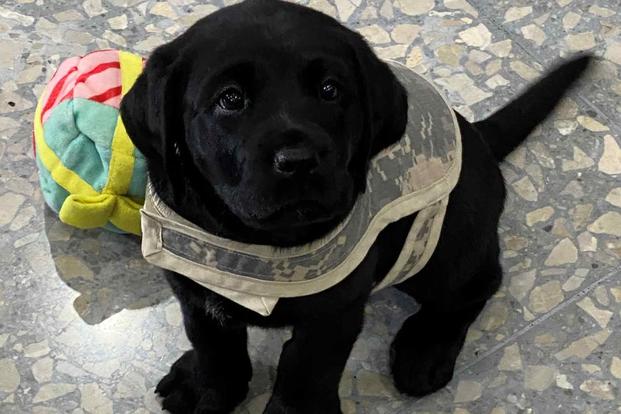Military.com | By Patricia Kime
Updated May 09, 2024 at 11:45 am | Published May 08, 2024 at 6:03pm ET
Rick Yount remembers meeting a veteran with severe post-traumatic stress disorder who wouldn't leave the safe confines of Walter Reed National Military Medical Center, where he was being treated. Yount, founder of Warrior Canine Connection, a nonprofit that supplies service dogs to veterans, handed over a puppy to train.
From that day forward, the service member would need to take the young golden retriever everywhere -- stores, crowds and Washington, D.C.'s Metro transit system, with its steep escalators that frighten even the most docile dogs.
"He was teaching the dog that the world was a safe place and the only way he could teach the dog ... he had to convince himself at the same time. It changed everything," Yount said.
To highlight the positive impact dogs can have on mental health, the Department of Health and Human Services hosted a "Puppy Cam" event Wednesday in Washington, D.C., for national Mental Health Awareness Month, with officials from the Department of Veterans
Speakers included VIPs such as HHS Secretary Xavier Becerra and VA Under Secretary for Health Dr. Shereef Elnahal. But it was the puppies -- half a dozen squirming, wriggly, adorable Labradors -- who stole hearts and minds.
"What can be better than puppies? Nothing is better than puppies in order to help our mental health and center ourselves," said Public Health Service Adm. Rachel Levine, the assistant secretary for health at HHS.
Warrior Canine Connection was founded in 2011, three years after Yount created a training program to help veterans with the symptoms of PTSD and traumatic brain injury.
The idea was simple: Train veterans to train future service dogs. The dogs come to the veterans as puppies and leave roughly 14 months later, graduating to advanced training to learn tasks to help their future partners.
In the years since, the group has started a 24/7 puppy cam that has amused and comforted hundreds of thousands of viewers through wars and a pandemic, launched community service programs in Veterans Treatment Courts across the country, and taken its mission to prisons.
It has a Military Family Support Dog program that provides animals trained to sense anxiety and stress in each family member, and its dogs routinely visit hospitals, with one graduate, U.S. Public Health Service Commissioned Corps Lt. Cmdr. Abigail, working full time as a facility dog at the National Institutes of Health.
"Isolation is a very, very dangerous thing and it's a very common thing, unfortunately," Yount said. "I've never seen a being break through isolation with an ability to connect to people like a sweet, loving dog. It sounds simple, but it doesn't make it any less important because it's simple."
The VA launched a five-year pilot program in 2022, Puppies Assisting Wounded Service Members, or PAWS, that teaches veterans with PTSD to train service dogs. The program is underway at five VA facilities: Anchorage, Alaska; Asheville, North Carolina; Palo Alto, California; San Antonio, Texas; and West Palm Beach, Florida.
Elnahal said Wednesday that the veterans he has spoken with have called the program "lifesaving" and the VA is using information from the program and other canine programs through community partners to "build a case" for expansion.
"We want to be able to go to Congress and say, 'Here are the benefits we are seeing; here is why we need to scale this up' so we can get the resources we need," Elnahal said.
Service dogs are expensive to train, with costs running from $10,000 up to $60,000 depending on the intensity of the training. The VA currently covers veterinary costs of service dogs for veterans with physical disabilities, including blindness and mobility issues.
Veterans have pressed for coverage for service dogs to address mental health conditions and other physical disabilities, including epilepsy.
A study published by the VA in 2021 found that service dogs trained to address post-traumatic stress disorder decrease the severity of symptoms better than emotional support animals, a category that includes companion animals that aren't necessarily trained to do tasks or address medical symptoms.
But Elnahal said the VA needs to continue conducting research on veterans and dogs to ensure that it has the evidence it needs to justify funding for the programs. In addition to requiring the PAWS program, legislation that passed in 2021 allowed the VA to cover the cost of service dogs for mental health conditions, but the program was not funded through appropriations.
"What we need to do is continue to prove the case, through not just research on established outcomes for anxiety, PTSD, depression, but experientially -- how these dogs are improving veterans' lives. The comments I've heard are striking: One veteran said the program is the reason he stopped contemplating how to end his own life, and that was in a very public setting," Elnahal said.
Editor's note: This story has been updated to reflect that the Department of Health and Human Services hosted the event.

Power of Puppies: Advocates Promote Canine Care to Treat Veterans' Mental Health Conditions
Labradors were brought to the D.C. headquarters of the Department of Health and Human Services on Wednesday to raise awareness of the role of canine companionship in mental health care.









